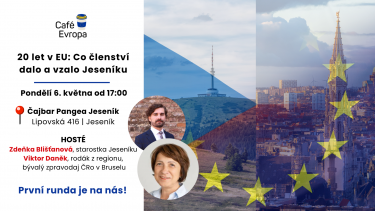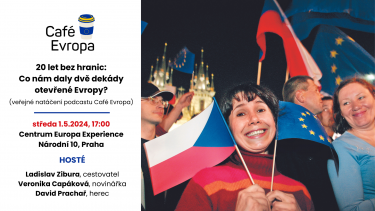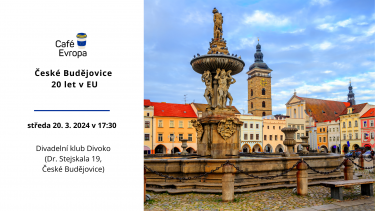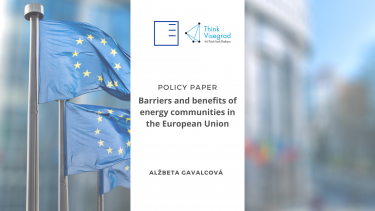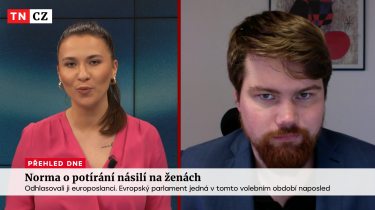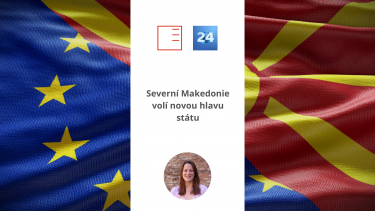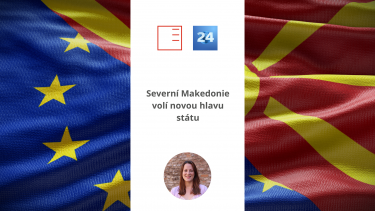Café Evropa | 20 years in the EU: what has membership given and taken away from Jeseník?
We invite you to the next Café Evropa debate! Green Deal, migration, security, EU elections, EU subsidies... Are you interested in what's in it for Jeseník? Our guests will answer these and other questions. Come and discuss!
Show moreCafé Evropa | 20 let v EU: Co členství dalo a vzalo Jeseníku?
Zveme vás na další debatu Café Evropa! Green Deal, migrace, bezpečnost, eurovolby, dotace z EU... Zajímá Vás, co z toho má Jeseník? Na tyto a další otázky, Vám odpoví naši hosté. Přijďte diskutovat!
Show moreCafé Evropa | 20 years without borders: what have two decades of open Europe given us?
We invite you to a public recording of the Café Evropa podcast. Come and discuss twenty years of open Europe with representatives of the generation that has lived most of its life there, as well as those who remember the past regime and the waiting at the borders. What do you remember?
Show moreCafé Evropa: České Budějovice 20 years in EU
We invite you to the next debate of the Café Evropa series. Come and talk to us about what current european issues are resonating in České Budějovice and how you imagine Europe. Are you interested in nuclear energy, electromobility, euro, local projects supported by the EU, culture or any other european topics?
Show morePolicy Paper | Barriers and benefits of energy communities in the European Union
Energy communities are an effective means to decentralize and renew our energy systems with sustainable solutions as they are usually based on renewable energy. They have already started emerging in 1970´s, yet there has been a significant increase in their development only in recent years, also in terms of their introduction into the EU legislation. Especially in Western and Northern European countries the concept already enjoys vast popularity. On the other hand, in Central and Eastern European countries (further referred to as CEE) energy communities are only beginning to emerge. The policy brief (based on literature and interviews with various stakeholders ) examines the benefits energy communities may bring, and more importantly, the main obstacles remaining in their way for greater evolution in the CEE region – and especially Visegrad countries (V4). As these initiatives progress, sharing the best practices will ensure the success of the community energy in the energy transition. Writes Alžbeta Gavalcová.
Show morePolicy Paper | Barriers and benefits of energy communities in the European Union
Energetické komunity jsou účinným prostředkem decentralizace a obnovy našich energetických systémů pomocí udržitelných řešení, protože jsou obvykle založeny na obnovitelné energii. Začaly se objevovat již v 70. letech 20. století, avšak k jejich výraznému rozvoji došlo až v posledních letech, a to i z hlediska jejich zavedení do legislativy EU. Zejména v zemích západní a severní Evropy se tato koncepce již těší velké oblibě. Naproti tomu v zemích střední a východní Evropy (dále jen SVE) se energetická společenství teprve začínají vytvářet. Tento politický brief (založený na literatuře a rozhovorech s různými zúčastněnými stranami ) zkoumá výhody, které mohou energetická společenství přinést, a především hlavní překážky, které jim stále stojí v cestě k většímu rozvoji v regionu střední a východní Evropy - a zejména v zemích Visegrádské skupiny (V4). Jak tyto iniciativy postupují, sdílení osvědčených postupů zajistí úspěch komunitní energetiky v energetickém přechodu. Píše Alžbeta Gavalcová.
Show moreTN.cz | Last session of the European Parliament before the elections
The last plenary session of the European Parliament before the June elections took place in Strasbourg, France. In addition to the ceremonial commemoration of the twentieth anniversary of the biggest EU enlargement to date, which also saw the Czech Republic become a member state, MEPs also discussed the Iranian attack on Israel and a regulation to combat violence against women. Martin Vokálek, director of the EUROPEUM Institute, gave a detailed analysis of the meeting for TN.cz.
Show more
TN.cz | Poslední zasedání Evropského parlamentu před volbami
Ve francouzském Štrasburku se odehrálo poslední plenární zasedání Evropského parlamentu před červnovými volbami. Kromě slavnostního připomenutí dvacátého výročí od dosud největšího rozšíření EU, při kterém se členskou zemí stala i Česká republika, poslanci jednali i o íránském útoku na Izrael nebo předpis o potírání násilí na ženách. Pro TN.cz zasedání komentoval Martin Vokálek, výkonný ředitel Institutu EUROPEUM.
Show more
ČT24 | Northern Macedonia elects new head of state
Polls opened in North Macedonia on Wednesday for the first round of the presidential elections. Seven candidates are running for the presidency in a country gripped by political tensions, disappointment with democratic reforms and aspirations to join the European Union. Jana Juzová, a senior researcher at EUROPEUM Institute, analysed the situation in an interview for ČT24.
Show moreČT 24 | Severní Makedonie volí novou hlavu státu
V Severní Makedonii se ve středu otevřely volební místnosti v prvním kole prezidentských voleb. O prezidentský post se v zemi zmítané politickým napětím, zklamáním z demokratických reforem, ale i aspiracemi na vstup do Evropské unie, uchází hned sedm kandidátů. Situaci rozebírala v rozhovoru pro ČT24 seniorní výzkumná pracovnice Institutu EUROPEUM Jana Juzová.
Show moreStaroměstské náměstí 4/1
Prague 1 - Staré Město
110 00
tel.: +420 212 246 552
email: europeum@europeum.org
https://www.europeum.org
